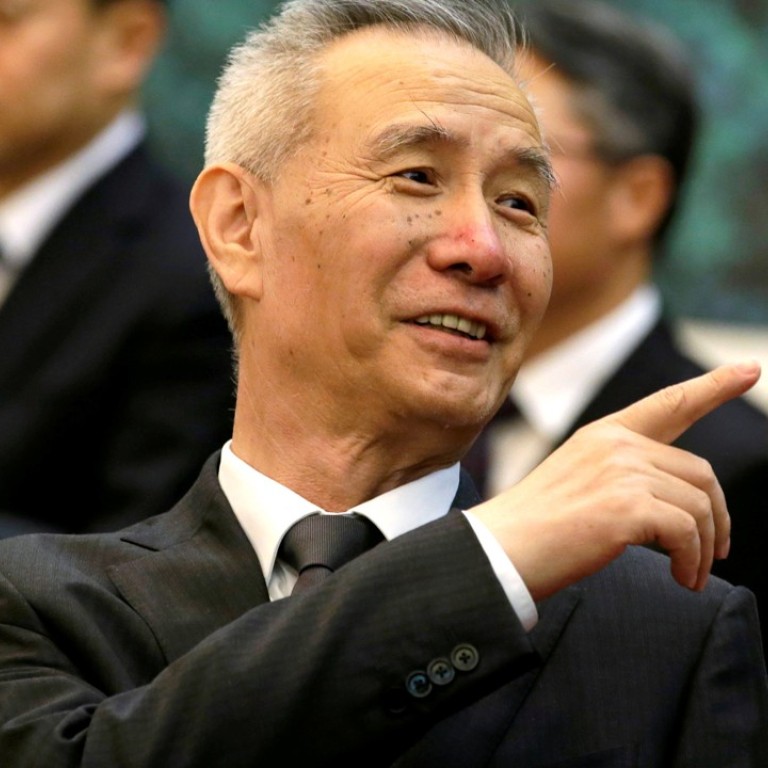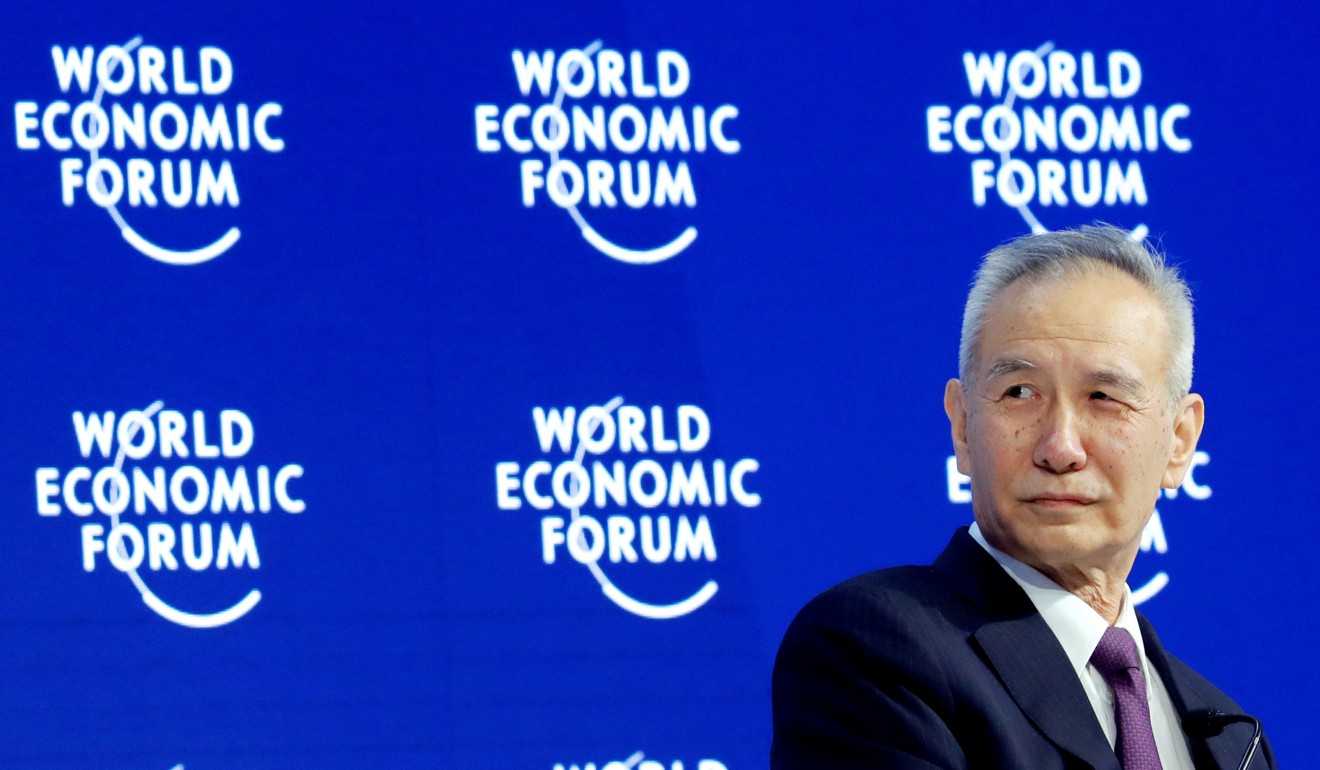
Why China’s top economic adviser Liu He could be next central bank chief
Source says Beijing is looking for ‘highly trusted and resourceful figure’ to take the lead on reforms – and Liu stands out
President Xi Jinping’s bold plan to transform China’s increasingly complex financial agencies has made his trusted aide Liu He the most likely candidate to head the central bank, according to sources close to the People’s Bank of China.
The Harvard-educated technocrat – and President Xi Jinping’s right-hand man on economic policy – is highly likely to succeed 70-year-old Zhou Xiaochuan as head of the central bank after China’s annual legislative session is held next month, people with knowledge of the situation said.
At the same time, Liu, 66, is also widely expected to become vice-premier in charge of economic and financial affairs in March. That would put him on a par with Zhu Rongji, known for his tough approach to tackling the economic chaos when he was vice-premier and central bank governor from 1993 to 1995.
“Liu He stands out from the other candidates because the top leadership has decided that only a highly trusted and resourceful figure can take the lead on increasingly complicated reforms,” one of the sources said.
Liu also stands out because China is considering a major restructure of its top government agencies. One of the proposals on the table is to elevate and expand the functions of the central bank, according to sources.
There has been speculation that the central bank could take up some of the responsibilities of the top economic policymaking agency, the National Development and Reform Commission, and the Ministry of Finance.
On Saturday, Xinhua reported that the elite Central Committee would discuss a plan to restructure party and government agencies at a plenary session early next week.
The restructuring and the appointment of a new central bank governor will be key to China’s efforts to tackle financial risks, which is now a top government priority.
Changes at the top during a broader reshuffle can be subject to last-minute changes in China, and many other names have been reported as front runners to replace Zhou when he retires after a decade and a half in the job.
They include Guo Shuqing, chairman of the China Banking Regulatory Commission, Jiang Chaoliang, Hubei party secretary, Yi Gang, deputy governor at the central bank, and Liu Shiyu, chairman of the China Securities Regulatory Commission.
“It’s not final, but currently Liu is ahead of the other candidates,” a second source said. “The leadership has high hopes that the new governor will be able to win the battle against financial risks and coordinate reform needs in the financial sector and for state-owned enterprises.”
Liu is director of the Office of the Central Leading Group for Financial and Economic Affairs and a vice-chairman of the top planning body, the National Development and Reform Commission.
Having spent most of his career in government think tanks, Liu was reportedly introduced by Xi as someone “very important” to him when he met a visiting US delegation in 2013.
He is also regarded as the mastermind behind Xi’s supply-side structural reform. In an analysis in government mouthpiece People’s Daily in May 2016, an “authoritative person” believed to be Liu said high-speed growth was a thing of the past – and that sustainable economic development could only be achieved through structural adjustment and innovation.
Since he was elevated to the 25-member Politburo at the Communist Party congress in October, Liu has been widely expected to take a front-row seat in steering the Chinese economy. He is also set to become the head of the cabinet-level Financial Stability and Development Committee.

Last month, Xi sent him to lead China’s delegation at the World Economic Forum in Davos. He told the world’s rich and powerful at the Swiss ski resort that China would open its domestic markets wider and that this year’s reform measures could “exceed the international community’s expectations”.
Zhao Xijun, associate dean of Renmin University’s school of finance, said there were parallels between China’s economy today and in the 1990s.
“China’s complicated economic and financial situation is similar to that of the ’90s, when Zhu was in charge,” he said. “And the challenging role of China’s central bank calls for a capable leader.”
In the aftermath of a global recession in the early 1990s, the Chinese economy was crippled by excessive fixed-asset investment, redundant monetary supply and a chaotic financial market – problems China is still grappling with more than 20 years on.
Zhu tightened money supply, reformed the tax system and the state banking sector and cleared the debts of state-owned enterprises – if Liu does take charge on the economy he will face similarly thorny issues. They include reducing the leverage of SOEs, making financial institutions serve the real economy and preventing systemic economic and financial risks, Zhao said.
Gary Liu Shengjun, head of the China Financial Reform Institute in Shanghai, expected Liu to spearhead financial and economic reform in the next five years.
“He’s trusted by the top leadership, respected in academia and he also has connections in the State Council because he used to work with the cabinet’s think tanks. He’s prudent and he’s a problem solver,” he said. “I think we will see Liu seizing this opportunity to realise his ambitions as a liberal intellectual and pave the way for further reform and opening up.”
Regardless of who takes the central bank governor role, the job will be a lot different from 10 or 20 years ago, said Aidan Yao, senior emerging Asia economist at AXA Investment Managers.
“At that time the main goal was to nurture a market-driven economy with a complete financial system, so the work was more to do with internal liberalisation,” Yao said.
“Now, as China’s economy and banking system are much bigger and far more complicated, the key tasks will also include external liberalisation – opening up markets that are restrictive to foreign investment as well as capital accounts.”
But he said a new line-up of officials “won’t change the fact that all big decisions regarding development direction or the pace of liberalisation will be decided by president Xi”.
“These people will serve, first and foremost, as advisers to president Xi to implement and execute what he wants,” he said.
Additional reporting by Xie Yu

